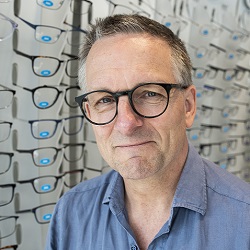General News
Glaucoma ‘time bomb’ warning
Glaucoma ‘time bomb’ warning –
The launch of the report is timely with World Sight Day taking place on Thursday 13 October, with a focus on the importance of eye care.
A NEW report has warned the UK faces a glaucoma ‘ticking time bomb’ – and that community optometrists can help defuse it.
The State of the UK’s Eye Health 2022 report says that there is a glaucoma ‘emergency’ in the wake of rising demand and the after-effects of the pandemic. The launch of the report is timely with World Sight Day taking place on Thursday 13 October, with a focus on the importance of eye care.
While highlighting examples of good practice in glaucoma care throughout the UK, the report shows how the system is failing patients – some are facing catastrophic consequences after experiencing irreversible sight loss while on waiting lists.
Ophthalmology has long been struggling to meet rising demand, with ongoing delays in hospital appointments and the impact of the pandemic adding to the huge backlog. The pandemic saw restrictions to routine eye testing, reduced outpatient appointments and waiting list surgeries cancelled. In addition, ‘Stay at home’ messages caused patients to present late with more advanced disease.
Written by eye health experts, the report warns more than two million people with glaucoma and ocular hypertension are at risk of vision loss yet there are long waiting lists for NHS ophthalmology appointments. Despite risk stratification, new patients are waiting 18 months for an appointment in some areas. The Royal College of Ophthalmologists predicts demand for glaucoma services will increase by 44 percent by 2035. With the ageing population the situation will only get worse unless major changes are made.
Glaucoma is the leading cause of irreversible blindness worldwide, yet many people do not know they have it – typically there are no symptoms to begin with and glaucoma develops slowly. Glaucoma accounts for 20 percent of NHS outpatient appointments but as many as half of all cases are undiagnosed. People may be unaware they have the condition until it is detected in a routine eye test. Early detection and treatment can usually minimise vision loss.
There were 633,000 people waiting for NHS ophthalmology appointments in May 2022, says the report. More than a third of ophthalmology patients had not been seen within 18 weeks, the maximum waiting time set out in the NHS constitution, while 24,200 people have been waiting longer than a year.
As to tackling the glaucoma time bomb, eye health experts say an enhanced role for community optometrists – working with ophthalmologists – is crucial.
The assessment follows a joint vision statement from The College of Optometrists and The Royal College of Ophthalmologists setting out how primary and secondary care providers can work together to deliver high quality patient care. This is now underpinned by new guidance that maps clinical training to glaucoma patient pathways.
‘This joint guidance empowers local optometrists with specified qualifications to manage patients in the appropriate glaucoma risk categories within their primary care settings. Only by increased working in multidisciplinary teams, with everyone working to the top of their licence and skill set can we ensure patients with glaucoma are looked after in a timely manner in the right setting. This will reduce the risk of avoidable sight loss and protect our nation’s eye health,’ says Professor Bernie Chang,
President of The Royal College of Ophthalmologists, Professor Anthony King, consultant ophthalmologist and Chair of Glaucoma UK, says the pandemic saw the eye care sector re-evaluate how it functions, accelerating delivery of virtual clinics and prioritising high-risk patients using risk stratification tools.
‘It also reviewed care pathways, shifting more care to community-led models where appropriate and enabling those at lower risk of sight loss to be monitored by qualified community-based health care professionals, particularly high street optometrists,’ he says.
‘These actions undoubtedly helped those patients in the greatest need of care, but many more are still waiting to be seen.’
Giles Edmonds, Clinical Services Director at Specsavers, which led the report, says optometry is well placed to be part of the solution with thousands of optometrists having already developed their knowledge using higher qualifications.
‘Continued exposure to patients in ophthalmology and shared clinics will only improve their skills. We have always been committed to funding these kinds of development opportunities for our clinicians and our world class continuing professional development programme is open to all,’ he adds.
The College of Optometrists’ President Professor Leon Davies and Adam Sampson, Chief Executive of the Association of Optometrists, say optometrists are able and ready to play their part in shaping the future.
Why looking after our eyes is so important

The State of the UK’s Eye Health 2022 report was officially launched by broadcaster, author and journalist, Dr Michael Mosley, who explains why looking after our eyes is so important.
‘A lot of diseases can manifest in the eyes and there are conditions which you can do something about if you detect them early enough. I think eye tests are so important. I try to have my eyes tested every two years.
‘A few years ago I started getting floaters – which are shapes drifting through your vision. I didn’t know what they were and thought the worst. My optician assured me it’s age-related, but they would continue to monitor. It was scary but great peace of mind to know it was not of immediate concern.
‘People can think a trip to the optician is only for people who wear glasses but there are lots of things your optician can do. A lot of eye damage goes undetected. I suspect there are a lot of treatable cases of cataracts and glaucoma that could be picked up early by an optician.’
























